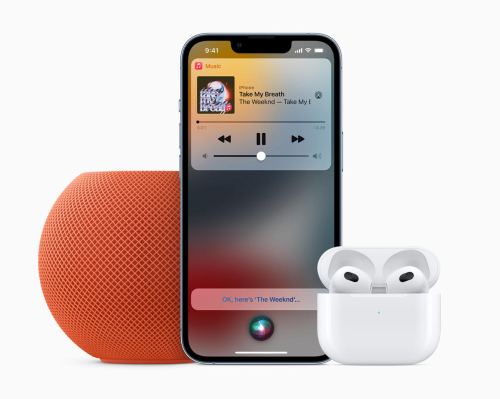Apple is now rolling out access to its new, lower-cost Apple Music Voice plan, first introduced this fall at the company’s hardware event. The new service, designed largely for use with HomePod speakers or AirPods, limits consumers to accessing Apple Music using Siri commands. Due to its stripped-down nature, the voice-only service is offered at $4.99 per month, compared with $9.99 per month for a standard individual plan.
The new music subscription is a part of the broader iOS 15.2 update, which also brings other features like app privacy reports, Message safety warnings for children, a “Hide My Email” privacy feature, and more.
Initially, some people may have been confused as to why anyone would want a music subscription designed only to be used by way of voice commands. But Apple was not the first company to go this route, in fact.
In 2019, Amazon introduced a more affordable way to stream its Amazon Music service with the launch of a free, ad-supported tier that streamed only over its Echo speakers. In other words, it was a version of Amazon Music that could only be accessed by way of Alexa commands.
Apple’s Siri-only service is similar, but isn’t restricted to Apple’s smart speakers alone. Instead, Apple says users will be able to request music using any of their Siri-enabled devices, including the HomePod, AirPods, iPhone, or other devices, as well as CarPlay.
The new voice-only tier isn’t a pared-down version of Apple Music with a limited song selection. Like traditional subscriptions, subscribers will gain access to Apple Music’s catalog of 90 million songs, its tens of thousands of playlists, and its hundreds of new mood and activity playlists, personalized mixes, and genre stations. It also includes Apple Music Radio.
To access this content, users can request a song, album or artist via Siri, or, more likely, they can ask for a genre or type of playlist by using voice commands like “play something chill,” or “play the dinner party playlist,” or even “play more like this.”
Voice Plan subscribers can also use the Apple Music app to some extent. But instead of being able to browse across the full library, as usual, a “Listen Now” screen will present music they had recently played and will help them to discover more recommendations that can be played with either a tap or a Siri command. A Radio tab will offer access to live and on-demand radio. And there is a Search feature, but you can only play the results by asking Siri. The app will also include a section that teaches users how to optimize Siri for Apple Music.
Users can give Siri specific feedback by saying things like “I like this song,” or “I don’t like this song,” and learn about the music being played by asking things like who sings a song, the song or album name, the release year, and more.
Over time, users who engage with Apple Music with their voice will be training Siri to better understand their preferences. That means they’ll be able to ask Siri to “play some music I like” or “play my favorites mix” and Siri, in theory, would deliver music they enjoy listening to.
In addition to being competitive with Amazon’s Echo-only plan, the Apple Music Voice Plan could help Apple gain access to a trove of user data on Siri usage, which could help it to improve its product, which has lagged behind both Alexa and Google Assistant. More broadly, it’s also just an easy way for Apple to entice price-sensitive users to try out a paid music subscription service for the first time. Further down the road, the voice plan could lead these users into higher-priced tiers after they realize the convenience of having access to on-demand and ad-free music, instead of relying on a free, ad-supported option like Pandora.
The Apple Music Voice is available via the iOS 15.2 update in Australia, Austria, Canada, China, France, Germany, Hong Kong, India, Ireland, Italy, Japan, Mexico, New Zealand, Spain, Taiwan, the U.K., and the U.S.
